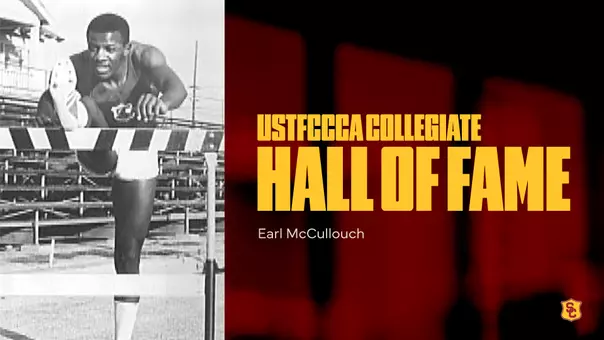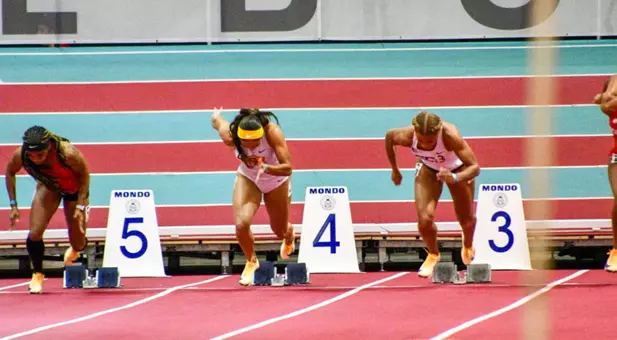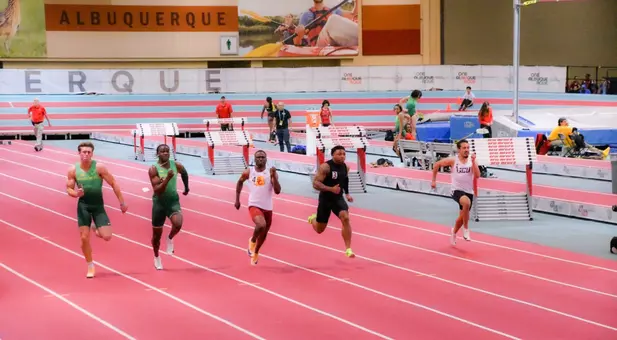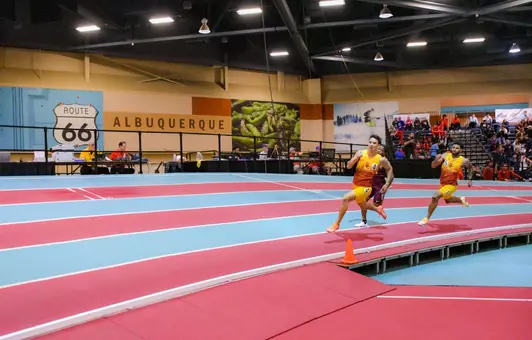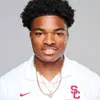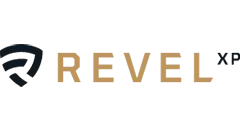University Southern California Trojans
Players Mentioned
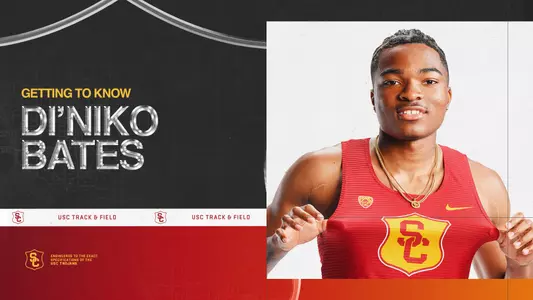
Getting To Know Di'Niko Bates
April 11, 2024 | Track & Field
This edition of "Getting To Know" features junior transfer hurdler Di'Niko Bates. Outside of being an incredibly talented hurdler, Bates is an avid music listener and fashion fanatic whose aspirations fall nothing short of motivation, determination and excitement.
Q: You transferred from Cal, did you intentionally stay in California or were you thinking of leaving your home state at some point?
D.B.: When I was thinking of transferring, I wasn't thinking necessarily about where the school was. I was more focused on the coaching and the athletes I'd be around. I knew SC had a great culture and joining the hurdle coach, (Joanna) Hayes, and practicing next to some of the NCAA's best every day is something you can't beat. Overall, it was just a smart decision to take this opportunity here at USC.
Q: I know hurdling is your specialty, but when you started competing in track did you focus on any other events?
D.B.: I started off just doing sprints and jumps. I knew I was fast because after my first year I went to the Junior Olympics and got top five in all my sprinting events. I also got eighth in the nation in jumps my first year when I was around nine. At that point I realized "Okay I'm good, I can do this.". Seeing my teammates who hurdled, Sasha Wallace who ran for Oregon and Kevin Craddock who ran for UCLA under Nike, competing professionally made me realize I wanted to do that too.
Q: How did that transition from sprinting and jumping to hurdling happen?
D.B.: It definitely wasn't an accidental thing. I walked up to the hurdle coach and told him I wanted to do that instead of sprinting and jumping. I started hurdling my second year and started off with 80m hurdles at around 10 years old. Again, I was placing top 10 in the nation and that's when I really knew this is something I should stick with and wanted to stick with.
Q: Would you say your teammates you mentioned before are a motivating force for you to reach the goals you set out for yourself?
D.B.: They're definitely a part of it. I feel like the legacy of Oakland hurdlers is something that should continue, and I want to be one of the people that helps keep it going. What keeps me going is knowing that I haven't reached my full potential. Even though I look to other people for inspiration I mainly look at my progression and see what I've done each year. I analyze that before going into every season and then thinking about how that will play a part in the season coming up. I have a lot of growing to do, but that's why we're here.
Q: What does reaching your full potential look like to you?
D.B.: I've always been very intentional with what I want to do with the sport. A gold medal, USA uniform, and a Pac-12 Championship are all goals I want to reach. I don't want to put everything on just winning. I know whatever I put out there I'm going to have a good result because I'm trying and putting my best effort forward. Making sure I don't take any shortcuts and use all the resources available and put all my effort into doing what I need to do. Yes, winning a gold medal and being a part of Team USA is part of it, but it's really what I do on the backend that will catapult me into reaching that.
Q: Has joining the program here shifted your perspective on any aspects of your life?
D.B.: From an academic standpoint I'd say that my goals have brightened. Getting the opportunity to sign here gave me a second chance to get back in my bag and think about what I want to do outside of track. When it comes to track, being around people that I grew up watching on TV, like coach Hayes and coach [Quincy] Watts, keeps me incredibly motivated. I've always wanted to do it, but actually being in the front seat with Olympic gold medalists, world champions and record-holders, you get to take after them in a sense. At practice I'm a sponge, just soaking up everything they're telling me.
Q: You're currently a sociology major on a pre-law track, what do you see yourself doing with it?
D.B.: I want to become a lawyer for track & field athletes after I'm done competing. Being at the top Olympic University there's an abundance of resources to help me get there. I've been trying to use all that I can.
Q: Why law?
D.B.: Growing up my mom always said that I'd be a great lawyer because I always argue, especially with my siblings. I always wanted to have the right answer even if I was wrong, I really believed it. It wasn't until high school that I realized I liked it. I've never been a big mathematics person, but I took Government, a class where we would interpret law.
Q: What about it specifically piqued your interest?
D.B.: As an inner-city kid from Oakland, learning about how the government is set up, how the law works, and the corruption in it made me want to try and change the dynamics of what it means to be an inner-city kid. You don't always have to be a product of your environment and I try to be an example of that. Also, in general, I feel like it's good for athletes to help other athletes.
Q: What makes you say that?
D.B.: I think that having a pro-lived experience and being able to understand and give back to other athletes is very important. You see a lot about how track is undervalued, and not very appreciated, specifically here in America…like what happened with Allyson Felix and Sha'Carri Richardson. I'd want to figure out the discrepancies and try to prevent experiences like that from happening to more athletes.
Q: Have you encountered any personal challenges that may have put things into perspective a bit more?
D.B.: I thought I knew my body a good amount, but you don't really know your body until you push it to the max. And here at SC we're pushing it to the max every day. The practices are intense, you've got to be sharp and ready to go. It took me a couple of weeks to get used to it, but once I did, I understood that this was something that I just needed to get through.
Q: You list one of your favorite things to do is shop, what are your favorite clothing brands?
D.B.: I love Diesel and Japanese designer Maison Mihara Yasuhiro. Zara is good for just going in and grabbing what you need. You might not like the price tag but it's convenient. I also really like Off-White and then classics like Nike and Adidas.
Q: You enjoy traveling as well?
D.B.: Yeah, even though I haven't been out of the country that much. I've been to Cabo for a senior graduation trip but I really want to travel to different continents, so hopefully everything goes right this year so I can be able to do that.
Q: If you could go somewhere at this very moment where would you go?
D.B.: Probably Seychelles. It's an island off the East African coast that I found when I was on Google Maps one day just looking around. It was a small little dot off the coast, and I clicked it, and it looked super nice. I've never been to Africa, so going there would be extra cool.
Q: Is there a skill or hobby that you want to try and start?
D.B.: I'd probably tap into playing an instrument. I used to play the clarinet when I was younger and could do a couple do-re-mi's but nothing serious. I really like music, so I think it'd be cool to pick something up.
Q: What does your playlist look like on a meet day?
D.B.: Early in the morning I'm playing gospel, Marvin Sapp, CeCe Winans, stuff like that. Then as I'm getting up, I get more into my R&B, Aaliyah, Donnell Jones. By the time the meet comes around I'm listening mainly to Lil Baby and Moneybagg Yo, other artists like that.
Q: You transferred from Cal, did you intentionally stay in California or were you thinking of leaving your home state at some point?
D.B.: When I was thinking of transferring, I wasn't thinking necessarily about where the school was. I was more focused on the coaching and the athletes I'd be around. I knew SC had a great culture and joining the hurdle coach, (Joanna) Hayes, and practicing next to some of the NCAA's best every day is something you can't beat. Overall, it was just a smart decision to take this opportunity here at USC.
Q: I know hurdling is your specialty, but when you started competing in track did you focus on any other events?
D.B.: I started off just doing sprints and jumps. I knew I was fast because after my first year I went to the Junior Olympics and got top five in all my sprinting events. I also got eighth in the nation in jumps my first year when I was around nine. At that point I realized "Okay I'm good, I can do this.". Seeing my teammates who hurdled, Sasha Wallace who ran for Oregon and Kevin Craddock who ran for UCLA under Nike, competing professionally made me realize I wanted to do that too.
Q: How did that transition from sprinting and jumping to hurdling happen?
D.B.: It definitely wasn't an accidental thing. I walked up to the hurdle coach and told him I wanted to do that instead of sprinting and jumping. I started hurdling my second year and started off with 80m hurdles at around 10 years old. Again, I was placing top 10 in the nation and that's when I really knew this is something I should stick with and wanted to stick with.
Q: Would you say your teammates you mentioned before are a motivating force for you to reach the goals you set out for yourself?
D.B.: They're definitely a part of it. I feel like the legacy of Oakland hurdlers is something that should continue, and I want to be one of the people that helps keep it going. What keeps me going is knowing that I haven't reached my full potential. Even though I look to other people for inspiration I mainly look at my progression and see what I've done each year. I analyze that before going into every season and then thinking about how that will play a part in the season coming up. I have a lot of growing to do, but that's why we're here.
Q: What does reaching your full potential look like to you?
D.B.: I've always been very intentional with what I want to do with the sport. A gold medal, USA uniform, and a Pac-12 Championship are all goals I want to reach. I don't want to put everything on just winning. I know whatever I put out there I'm going to have a good result because I'm trying and putting my best effort forward. Making sure I don't take any shortcuts and use all the resources available and put all my effort into doing what I need to do. Yes, winning a gold medal and being a part of Team USA is part of it, but it's really what I do on the backend that will catapult me into reaching that.
Q: Has joining the program here shifted your perspective on any aspects of your life?
D.B.: From an academic standpoint I'd say that my goals have brightened. Getting the opportunity to sign here gave me a second chance to get back in my bag and think about what I want to do outside of track. When it comes to track, being around people that I grew up watching on TV, like coach Hayes and coach [Quincy] Watts, keeps me incredibly motivated. I've always wanted to do it, but actually being in the front seat with Olympic gold medalists, world champions and record-holders, you get to take after them in a sense. At practice I'm a sponge, just soaking up everything they're telling me.
Q: You're currently a sociology major on a pre-law track, what do you see yourself doing with it?
D.B.: I want to become a lawyer for track & field athletes after I'm done competing. Being at the top Olympic University there's an abundance of resources to help me get there. I've been trying to use all that I can.
Q: Why law?
D.B.: Growing up my mom always said that I'd be a great lawyer because I always argue, especially with my siblings. I always wanted to have the right answer even if I was wrong, I really believed it. It wasn't until high school that I realized I liked it. I've never been a big mathematics person, but I took Government, a class where we would interpret law.
Q: What about it specifically piqued your interest?
D.B.: As an inner-city kid from Oakland, learning about how the government is set up, how the law works, and the corruption in it made me want to try and change the dynamics of what it means to be an inner-city kid. You don't always have to be a product of your environment and I try to be an example of that. Also, in general, I feel like it's good for athletes to help other athletes.
Q: What makes you say that?
D.B.: I think that having a pro-lived experience and being able to understand and give back to other athletes is very important. You see a lot about how track is undervalued, and not very appreciated, specifically here in America…like what happened with Allyson Felix and Sha'Carri Richardson. I'd want to figure out the discrepancies and try to prevent experiences like that from happening to more athletes.
Q: Have you encountered any personal challenges that may have put things into perspective a bit more?
D.B.: I thought I knew my body a good amount, but you don't really know your body until you push it to the max. And here at SC we're pushing it to the max every day. The practices are intense, you've got to be sharp and ready to go. It took me a couple of weeks to get used to it, but once I did, I understood that this was something that I just needed to get through.
Q: You list one of your favorite things to do is shop, what are your favorite clothing brands?
D.B.: I love Diesel and Japanese designer Maison Mihara Yasuhiro. Zara is good for just going in and grabbing what you need. You might not like the price tag but it's convenient. I also really like Off-White and then classics like Nike and Adidas.
Q: You enjoy traveling as well?
D.B.: Yeah, even though I haven't been out of the country that much. I've been to Cabo for a senior graduation trip but I really want to travel to different continents, so hopefully everything goes right this year so I can be able to do that.
Q: If you could go somewhere at this very moment where would you go?
D.B.: Probably Seychelles. It's an island off the East African coast that I found when I was on Google Maps one day just looking around. It was a small little dot off the coast, and I clicked it, and it looked super nice. I've never been to Africa, so going there would be extra cool.
Q: Is there a skill or hobby that you want to try and start?
D.B.: I'd probably tap into playing an instrument. I used to play the clarinet when I was younger and could do a couple do-re-mi's but nothing serious. I really like music, so I think it'd be cool to pick something up.
Q: What does your playlist look like on a meet day?
D.B.: Early in the morning I'm playing gospel, Marvin Sapp, CeCe Winans, stuff like that. Then as I'm getting up, I get more into my R&B, Aaliyah, Donnell Jones. By the time the meet comes around I'm listening mainly to Lil Baby and Moneybagg Yo, other artists like that.
USC Track & Field - 2025 NCAA Outdoor Championships: Day 4 Highlights (6/14/25)
Saturday, June 14
USC Track & Field - 2025 NCAA Outdoor Championships: Day 3 Highlights (6/13/25)
Friday, June 13
USC Track & Field - 2025 NCAA Outdoor Championships: Day 2 Highlights (6/12/25)
Thursday, June 12
USC Track & Field - 2025 NCAA Outdoor Championships: Day 1 Highlights (6/11/25)
Wednesday, June 11

